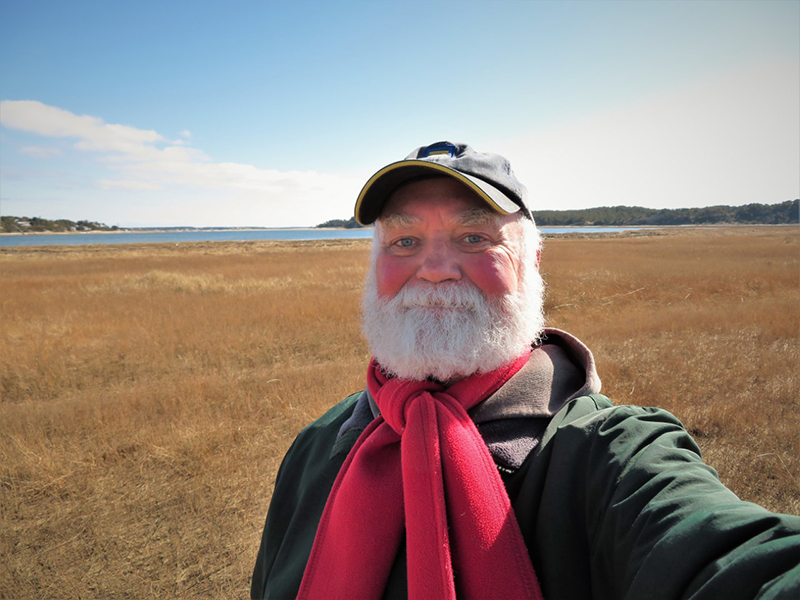Q&A with long-time Professor John French.
by Victoria Chiaramonte
Can you remember your first day on campus and can you describe it?
“Yes. When I got to my first class in [Wilkens North] 115 I saw that the previous professor was still in there. His name was Dr. Ruben Baker, quite a character. I asked him if this was indeed North 115. He walked outside the door, looked at the label and said, “I can’t imagine what else that would mean.” I was touched by his kindness. We later became good friends.

What will you miss most in retirement? The least?
“I will miss the students the most as well as my colleagues. I was very blessed to be in the English Department, a very tight and warm group of highly talented educators. I will also miss the whole college environment. There is always something of interest going on somewhere. As to the least; meetings. We have meetings to discuss new innovations that are to be implemented, we have meetings as they are implemented and then meetings to discuss why they were not as good as we thought they would be, but there is a new one on the way. I’ll never get those hours back in my life.”
How will you spend your time in retirement?
“Well, I have two wonderful dogs, Cocker Spaniels that love to walk the beaches and trails. I do a lot of stained glass and photography. I love kayaking and just being by the water. I am also a Master Gardener and hope to be able to give much more time to that organization now that I will have the time. I also have lovely gardens at my home, where my specialty is Dahlias. Other than that, nothing I guess.”
What made you decide to retire now?
“I have been teaching for 45 years. I love my profession, but always said that when I know the time has come, I will go. The time has come. Recently when comparing this national calamity to the assassination of the president when I was a kid and 9/11 tragedy, I was asked by a student, “was that Lincoln or Kennedy.” That was the icing on the cake.”
What’s your perspective on the effects of COVID-19 on education, both at this college and nationwide?
“Though I realize this is a game changer for life after this in many ways, I was proud to see my profession step up to the plate and continue what we do as best as we can at this time. I have been so moved by the amount of effort my colleagues throughout the college have put into making the transition to remote learning as positive an episode in the academic lives of our students as possible. Another take on this is that I believe in the lower levels, and I was an elementary/junior high principal in a Catholic school in Delaware, it might just have some very positive effects. Parents and children are forced to spend time together. Some parents have decided that there are other things a child can be taught besides math and grammar. I hear of some amazing things going on where families are learning new things together. My niece, a college professor, is teaching her kids to cook, knit and garden. Yes, they do their studies, but she said when would I have taught them some of these life skills if this had not happened.”
How are you coping personally with the virus?
“I don’t have it. No, seriously, I spent the first 13 years of my ministry in a cloistered Abbey. Being isolated does not really bother me. I have gotten a lot of work done around the house, spend more time with my dogs and find time for prayer, the center of a priest’s life.”
What would you say to new professors just starting out?
“I believe that this is attributed to Confucius, but I have always believed it, ‘If you love what you do, you’ll never work a day in your life.’ In many professions this is a necessity to not only survival, but to making a difference in what you do. I can honestly say, and I always began my classes by telling my students this, that I found this to be true in my career. Teaching was a hobby more than a job. If you’re going to thrive in this environment I believe that you have to have a similar mantra. Beginning my teaching career as monk. We were taught that we were there to help mold the body, mind and soul of our students. Ok, call soul what you want, let’s say spirit, but it is what makes up the people whose lives we are put in charge of educating.”
What is your last advice to give to students?
“Well, I don’t think I’m dying, but my last bit of advice as a full-time professor would be to love learning. Learn anything and everything that you can. Listen to every person with whom you come in contact; the least can teach you the most. It takes commitment to say “no” to going to that party or take that job that looks so sweet right now. The time you put into your education will make you more capable of handling difficult times, more compassionate, more interesting to be around, more employable and more happy. It is a big investment, but worth every penny of it.”
Categories: Professors, People